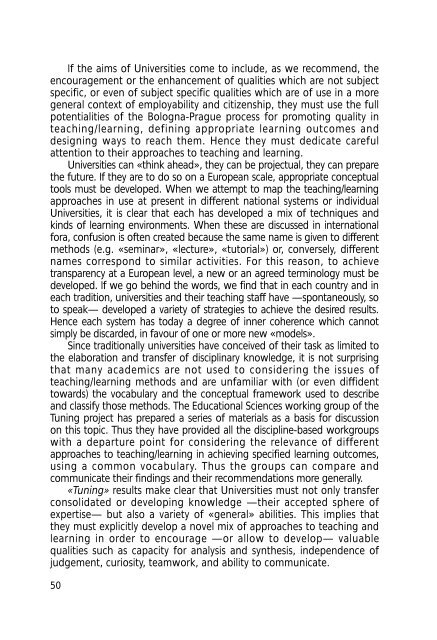Final Report Pilot Project - Relaciones Internacionales de la ...
Final Report Pilot Project - Relaciones Internacionales de la ...
Final Report Pilot Project - Relaciones Internacionales de la ...
Create successful ePaper yourself
Turn your PDF publications into a flip-book with our unique Google optimized e-Paper software.
If the aims of Universities come to inclu<strong>de</strong>, as we recommend, the<br />
encouragement or the enhancement of qualities which are not subject<br />
specific, or even of subject specific qualities which are of use in a more<br />
general context of employability and citizenship, they must use the full<br />
potentialities of the Bologna-Prague process for promoting quality in<br />
teaching/learning, <strong>de</strong>fining appropriate learning outcomes and<br />
<strong>de</strong>signing ways to reach them. Hence they must <strong>de</strong>dicate careful<br />
attention to their approaches to teaching and learning.<br />
Universities can «think ahead», they can be projectual, they can prepare<br />
the future. If they are to do so on a European scale, appropriate conceptual<br />
tools must be <strong>de</strong>veloped. When we attempt to map the teaching/learning<br />
approaches in use at present in different national systems or individual<br />
Universities, it is clear that each has <strong>de</strong>veloped a mix of techniques and<br />
kinds of learning environments. When these are discussed in international<br />
fora, confusion is often created because the same name is given to different<br />
methods (e.g. «seminar», «lecture», «tutorial») or, conversely, different<br />
names correspond to simi<strong>la</strong>r activities. For this reason, to achieve<br />
transparency at a European level, a new or an agreed terminology must be<br />
<strong>de</strong>veloped. If we go behind the words, we find that in each country and in<br />
each tradition, universities and their teaching staff have —spontaneously, so<br />
to speak— <strong>de</strong>veloped a variety of strategies to achieve the <strong>de</strong>sired results.<br />
Hence each system has today a <strong>de</strong>gree of inner coherence which cannot<br />
simply be discar<strong>de</strong>d, in favour of one or more new «mo<strong>de</strong>ls».<br />
Since traditionally universities have conceived of their task as limited to<br />
the e<strong>la</strong>boration and transfer of disciplinary knowledge, it is not surprising<br />
that many aca<strong>de</strong>mics are not used to consi<strong>de</strong>ring the issues of<br />
teaching/learning methods and are unfamiliar with (or even diffi<strong>de</strong>nt<br />
towards) the vocabu<strong>la</strong>ry and the conceptual framework used to <strong>de</strong>scribe<br />
and c<strong>la</strong>ssify those methods. The Educational Sciences working group of the<br />
Tuning project has prepared a series of materials as a basis for discussion<br />
on this topic. Thus they have provi<strong>de</strong>d all the discipline-based workgroups<br />
with a <strong>de</strong>parture point for consi<strong>de</strong>ring the relevance of different<br />
approaches to teaching/learning in achieving specified learning outcomes,<br />
using a common vocabu<strong>la</strong>ry. Thus the groups can compare and<br />
communicate their findings and their recommendations more generally.<br />
«Tuning» results make clear that Universities must not only transfer<br />
consolidated or <strong>de</strong>veloping knowledge —their accepted sphere of<br />
expertise— but also a variety of «general» abilities. This implies that<br />
they must explicitly <strong>de</strong>velop a novel mix of approaches to teaching and<br />
learning in or<strong>de</strong>r to encourage —or allow to <strong>de</strong>velop— valuable<br />
qualities such as capacity for analysis and synthesis, in<strong>de</strong>pen<strong>de</strong>nce of<br />
judgement, curiosity, teamwork, and ability to communicate.<br />
50


